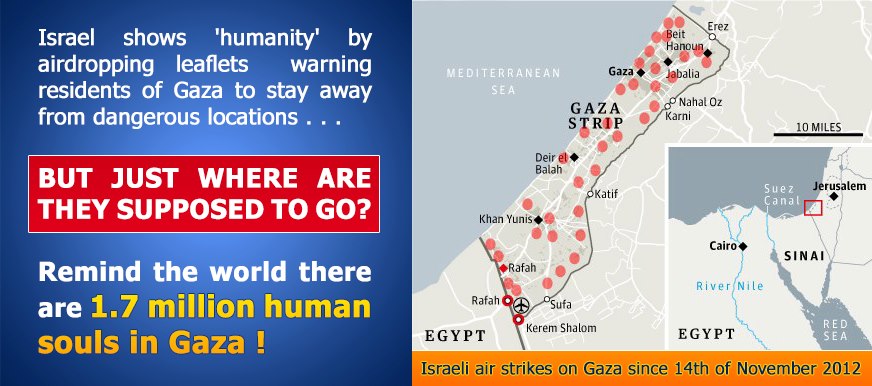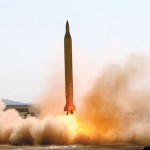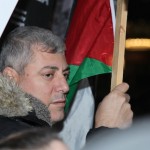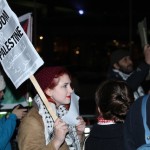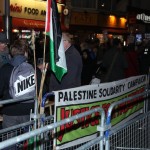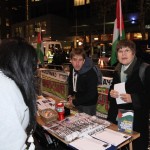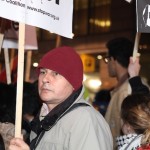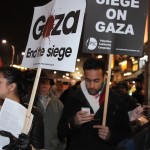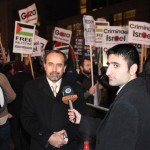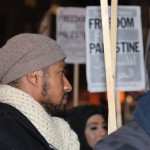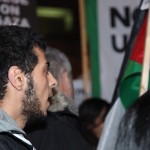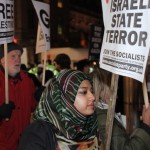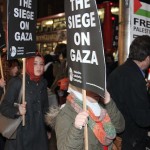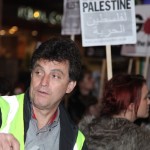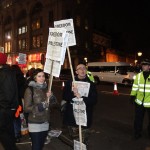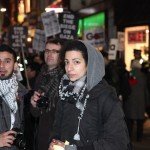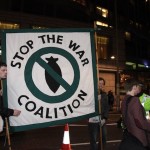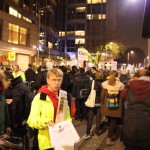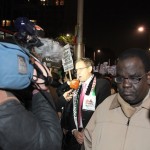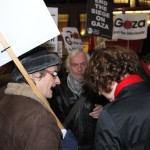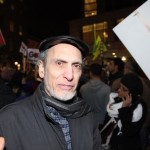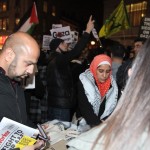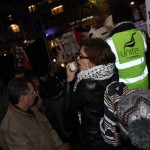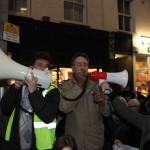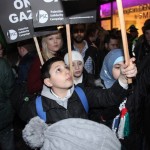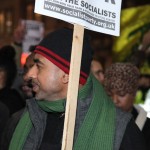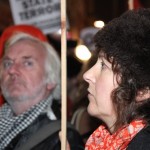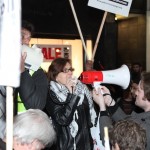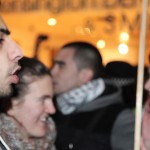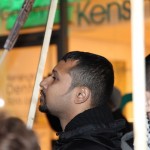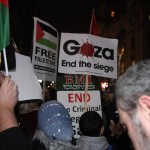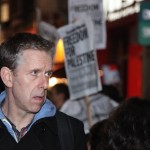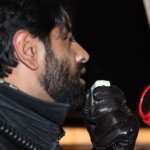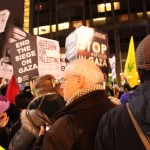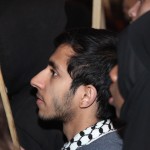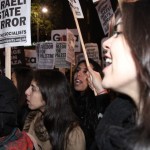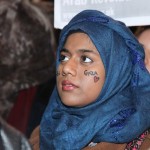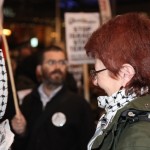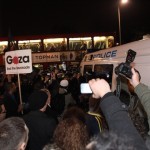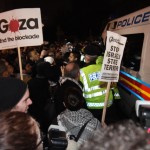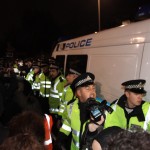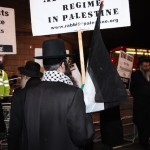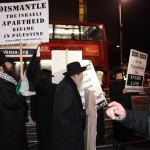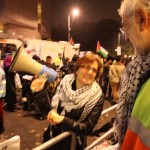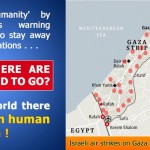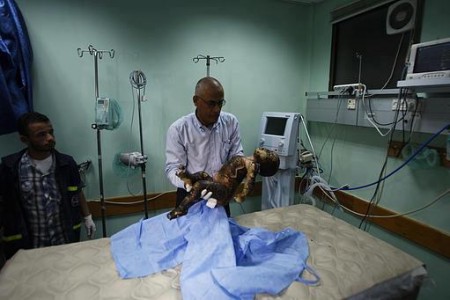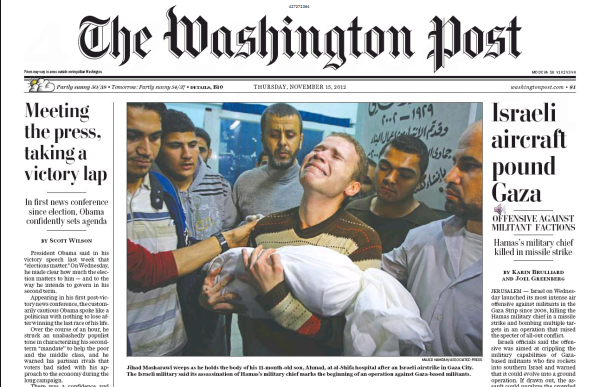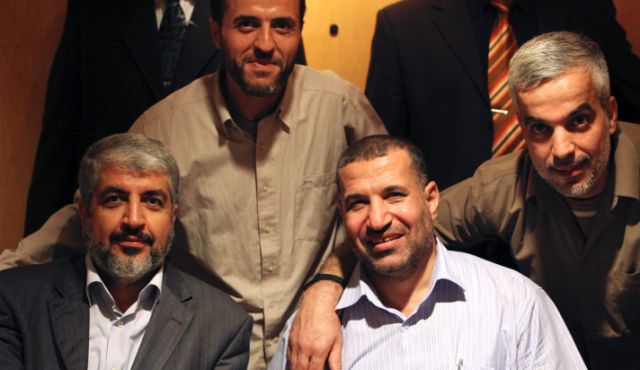EDITOR: The election war of 2012 continues!
In the aftermath of the US elections, and in the period leading to the Israeli one, we can expect much trouble in the middle East. Not only is Netanyahu livid about his candidate (Romney) losing the elections, but he also needs to test the Obama II period, so this is the first test for Obama in his second presidency, which he is likely to pass in flying colours, meaning, he will support any atrocity committed by Israel. It is also a test for the new Egyptian President, Morsi, who was active in setting up a ceasefire in Gaza JUST BEFORE the Israeli assasination on Wednesday of the Hamas military wing leader. Morsi knows he can no longer disregard public opinion in Egypt, like Mubarak did before him, which is strongly in support of the removal of the Gaza blockade, and in support of Palestine; yet, he too is worried about Obama II, and wonders wether he will have any freedom of action, before Washington cuts the funding… Sucha move by Obama will be lethal for Egypt.
Last, but not least, is the Israeli election – as opposed to all the Likud leaders: Begin, Shamir, Sharon and Olmert, Netanyahu still has no war to baost of. This is a basic requirement for any Israeli leader, not to mention one of the right wing of the Likud, like Netanyahu. Like in 2008, when Olmert started the war before the elctions, Netanyahu follows the script. So some will die, also in Israel, but he will guarantee his reelction. That is what is important, after all.
And if thought this is the end of it, read below: The Gaza attack is only the introduction to main course – the attack on Iran. Be frightened; be very frightened.
For Netanyahu, Gaza escalation could pave the way to Iran strike: haaretz
Until this week, Prime Minister Netanyahu took pride in never having lead Israel into a war. Now he may be on the verge of starting not one but two.
By Amir Oren | Nov.16, 22
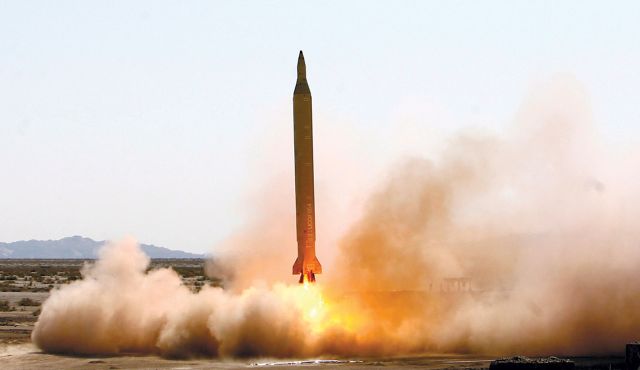
Prime Minister Benjamin Netanyahu and Defense Minister Ehud Barak have not given up the dream of carrying out a major operation in Iran. For some time, prior to the recent American election, they were in disagreement: Barak was against creating facts on the ground which President Barack Obama would be forced to deal with, whereas Netanyahu entertained the idea of exploiting the sensitive political period preceding what he thought would be the surefire victory of his esteemed ally, Mitt Romney.
As the election there recedes into history while ours approaches, this twosome is going back to dealing with the Iran plan – which is one that will necessarily influence the character of the next Knesset and government.
For Netanyahu, Operation Pillar of Defense is not a baptism of fire. Sixteen years have passed since the opening of the Western Wall tunnel in September 1996, an act that escalated events on the ground (called “Hot Iron” at the time by the Israel Defense Forces ). Netanyahu – at the time a novice, arrogant prime minister – took a public beating so painful that he was forced to revoke his refusal to make concessions to PLO leader Yasser Arafat concerning Hebron. Since then, throughout seven years of power during two terms in office, Netanyahu has kept his fingers off the trigger, and has even been proud of his restraint.
This week, however, the premier crossed a private red line by daring to authorize the undertaking of a large military operation. It isn’t a war, in his view, rather a military move whose goals, duration and achievements are circumscribed. But the dark cloud in the Gaza skies might serve as an alternative, or preface to, an Iran operation. It all depends on circumstances and what happens further down what may be a long road.
In any event, Operation Pillar of Defense has renewed the Netanyahu-Barak partnership, one which theoretically should have unraveled owing to potential candidacies of other figures for the Defense Ministry portfolio, from Likud or Yisrael Beiteinu.
In the world today, there is no a multidivisional, many-pronged operational-intelligence force that is better trained and more efficient than the IDF (which, of course, also works in conjunction with partner-deputies such as the Shin Bet security service, the Mossad and the police ). The gathering of precise information about the movement of senior enemy leaders and locations of firearms – and the transmission of this data, within seconds, to manned weapons systems – is done on a level which has yet to be reached by any other army. Usually, high-quality information gathering about the region can be obtained from human and technological sources. However, this work is done with respect to a relatively limited area, one under constant surveillance from the air, sea and land.
At the start of Operation Pillar of Defense, Israel made use of psychological warfare in order to deter and to exert influence; this approach involved the use of reservist call-ups, reinforcement of forces, and the sending of signals about a readiness to launch a land invasion as a result of the barrage of missiles, bombs and shelling. Now, Israel will try to make use of this show of strength as leverage in the Iranian context.
In theory, a force which is able to strike against Ahmed Jabari would be able to pinpoint the location of Iranian President Mahmoud Ahmadinejad. And a force that destroyed Fajr rockets would be able to reach their bigger siblings, the Shihabs, as well as Iran’s nuclear installations. So as not to leave a shred of doubt, the IDF Spokesman emphasized that “the Gaza Strip has become Iran’s frontline base.” At first glance, Operation Pillar of Defense seems to be aimed at the Palestinian arena, but in reality it is geared toward Iranian hostility against Israel.
This situation is fraught with implications – for example, the possibility that Israel will devise a new policy vis-a-vis the positive, more moderate half of the Palestinian arena, namely the Palestinian Authority, under Mahmoud Abbas and Salam Fayyad, in the West Bank. Up to now there has been no sign of such a move; perhaps it will come after the elections in January.
Practical test
Operation Pillar of Defense represents a practical test of expertise for the Israel Air Force commander and the head of IDF Intelligence, Maj. Gens. Amir Eshel and Aviv Kochavi, respectively. More than anything, however, it is a test for IDF Chief of Staff Lt. Gen. Benny Gantz, the commander whom neither Barak nor Netanyahu wanted – though now they heap praise upon him as though he were always their preferred choice.
One can guess what Barak would say if the IDF chief of staff were Yoav Galant, who served as commander on the Gazan front during Operation Cast Lead in 2008-2009. All this points to the basic character of the IDF, and to the fact that the army does not really change direction according to the person commanding it.
Barak has served as defense minister during these two operations. His chances of passing the electoral threshold and winning a Knesset seat with Atzmaut were negligible up to recent days. Now they have improved as a result of coincidences, both in security and political arenas; these include the fact that both Labor and Meretz have lost impressive possible candidates for their lists. Now Atzmaut, comprised of Barak and confederates, have the option of joining Labor, Likud-Yisrael Beiteinu or a centrist party headed by Shimon Peres and/or Tzipi Livni.
Lacking experience with military operations, Netanyahu is liable to draw erroneous conclusions from Operation Pillar of Defense, particularly if it ends relatively quickly with few casualties.
It is very tempting to think that the Gaza theater will remain quiet for months, until the renewal of smuggling of long-range missiles via the tunnels; that Sheikh Hassan Nasrallah will stop Hezbollah from using its weapons, in defiance of explicit orders from Tehran; and that the intelligence assessment of casualties likely to be sustained on the home front during an operation in Iran, based on the assumption that the Arrow antimissile system is used (although it has yet to demonstrate actual interception capabilities ), will in fact duplicate the performance of the Iron Dome system. All of these will constitute calculations in favor of an Iranian operation, particularly so long as Syria is stuck politically and militarily, owing to its domestic unrest.
Last week, directly after Barack Obama’s victory, Netanyahu made haste to talk about how he offered his congratulations to the reelected president. It turns out that Obama spoke that same day with 13 foreign leaders, including Egypt’s Mohammed Morsi, Saudi Arabia’s King Abdullah, Turkey’s Recep Tayyip Erdogan, heads of state from Colombia, Australia, Brazil and other countries, and Netanyahu.
During his recent visit to Moscow, President Shimon Peres managed to express Israeli sensitivity toward the bitterness felt by other powers – Russia foremost among them – about the precedence given to the Americans by Jerusalem. Anyone who wants to isolate Gaza needs the consent of regional powers. And anyone who wants to isolate Iran cannot depend on Washington alone.
Netanyahu has a one-track mind when it comes to two issues: the Iranian goal, and American support (which seems to be a bit shaky of late ). Should Operation Pillar of Defense attain the limited goals set for it in Gaza, that will be very good. Yet should the political leadership, buoyed by strong performances from the intelligence and other branches, try to extrapolate from this operation and transpose it to other places, it could be dangerous.
Gaza crisis: Egyptians back under-fire Palestinians: BBC
The BBC’s Wyre Davies describes a “long and difficult night” in Gaza, saying “the ante has been stepped-up on both sides”
Egyptian leaders have promised to support Gaza against Israeli attacks, as violence escalated for a third day.
President Mohammed Mursi said he would not leave Gaza on its own and condemned Israel’s “blatant aggression”, hours after his prime minister visited Gaza.
Israel mounted a huge attack overnight, targeting dozens of locations. Later, Gaza militants targeted Tel Aviv with a missile but there were no casualties.
Twenty Palestinians and three Israelis have been killed since Wednesday.
Militants and civilians, including at least five children, were among the Palestinian dead, Palestinian officials said. They include Hamas’s military leader Ahmed Jabari, killed by an Israeli air strike on Wednesday following a surge in rocket attacks from Gaza.
Two Israeli women and a man died when a rocket fired from Gaza hit a building in the southern town of Kiryat Malachi on Thursday, Israeli officials said.
Before the recent upsurge, Israel had repeatedly carried out air strikes on Gaza, as Palestinian militants fired across the border.
Powerful missiles
The Israeli army began an initial draft of 16,000 reservists on Friday, after the government authorised the call-up of 30,000.
Rumours have been swirling that a ground attack is imminent, but Israeli officials have said no decision has yet been made.
Israel targeted more than 130 locations in an overnight assault it said was aimed at knocking out rocket-firing facilities.
Sporadic Israeli air strikes have continued throughout Friday, and militants in Gaza have fired dozens of rockets.
Mr Mursi sent Prime Minister Hisham Qandil to the territory for a three-hour visit on Friday to show solidarity with the Palestinians.
“Egypt will not leave Gaza on its own, and what is happening is a blatant aggression against humanity,” the president said shortly after Mr Qandil returned from Gaza.
Ties between Hamas and Egypt have strengthened since Mr Mursi’s election earlier this year.
Hamas was formed as an offshoot of the Muslim Brotherhood, to which Mr Mursi belongs.
Panic in Tel Aviv
Meanwhile, the Israeli city of Tel Aviv, some 75km (45 miles) north of Gaza, came under attack for a second day.
A missile launched from Gaza sparked panic in the city and air-raid sirens once again sounded.
The missile appears to have done no harm, with police officials quoted variously as saying it had landed in the sea or in an unpopulated area.
It is the first time Tel Aviv has come under attack since the 1991 Gulf War.
Analysts say it is the first time Gaza militants have deployed such powerful missiles.
Western leaders have appealed for both sides to stop the escalation in violence.
Britain and Germany both said Hamas bears the brunt of the blame and should stop firing rockets immediately.
In Gaza, my son asks, what do the Israelis want from us?: The Electronic Intifada
Rami Almeghari Gaza Strip 15 November 2012
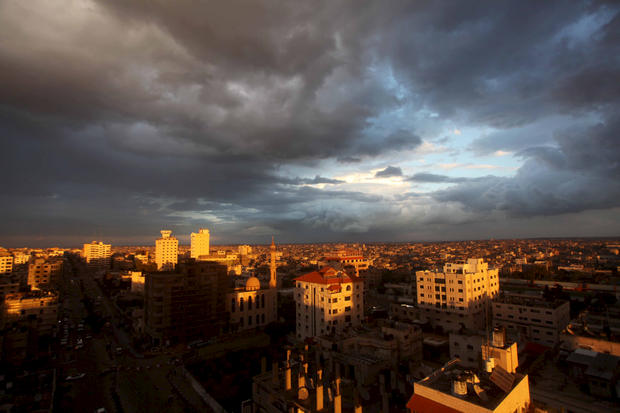
Palestinians in Gaza want to live normal lives and raise their children in a safe environment. (Ashraf Amra / APA images)
“What do they want from us? What do they want from us?” — this is the question posed to me by my son Munir who is now 13 years old. I had just returned from touring nearby towns here in Gaza out of journalistic duty on the second day of Israel’s massive military attacks.
Since the Israeli assassination of a top Hamas military commander yesterday afternoon, I have been following up on the news, reporting and writing the story of 13-year-old Ahmad Abu Daqqa, who was fatally shot in the stomach by an Israeli soldier last week while he played football outside his home in Khan Younis.
Munir and Ahmad are both schoolboys and each have a hobby. Ahmad was a football fan, while Munir is interested in news like his father. Whenever Munir approaches me, it’s inevitably to tell me some news or inquire about something.
Both Ahmad and Munir have spent their childhoods in the harsh, intolerable conditions in Gaza. As they were both similar in age and in terms of living conditions, they surely had the same question: ” What do they want from us?”
Ahmad has already got the answer. He was killed last Thursday by an Israeli bullet that ripped through his little body.
Meanwhile, Munir is outraged by the intensity of Israeli air strikes on Gaza, worried for the safety of his brother, two sisters, mother and other family members whenever a loud explosion is heard nearby. He wanted an authentic answer from his journalist father.
I wracked my mind for an answer that he could understand.
My wish for peace
I have always believed in peace. I have always believed in coexistence and I have always stayed away from violence. When I was a child like Munir, the first Palestinian uprising of 1987 broke out. Since then, I have believed in my right as a human being to live in freedom in a clean environment.
I recall that around that time, then secretary-general of the United Nations Javier Perez de Cuellar was visiting the occupied Gaza Strip in an observation mission. I picked up a broom and started cleaning the front door of my family home in Maghazi town in the central Gaza Strip.
“Ah, I see you are cleaning, apparently for the UN envoy who is coming over,” Ibrahim Mansour, an older neighbor of mine, told me while I was sweeping. I answered him: yes, I want these people to know that we are a life-loving nation!
This has truly been my dream. When I was able to join a UN-run media training program in New York City in 2001, I felt great, interacting with UN officials including Kofi Annan, the secretary-general at the time. I immediately talked about the people of Gaza. I mentioned the same cleaning story to the chief of the Palestine and Decolonization Center of the UN, Salim Fahmawi, who was in charge of the training program as well.
Since my return from the UN training program, I have dedicated my career to the sake of peace and coexistence, working relentlessly to tell the people outside Gaza that the Palestinians are a nation who love life and badly want to live normally like any other nation.
Do not even dream
Back to Munir’s question. Despite the fact that I do believe strongly in the power of peace instead of war, I felt I had to properly answer my son. “What do they want?” I exclaimed to Munir. “What they want is obviously to deprive us of our humanity, taking away our dream to live normal lives like other nations, and to throw us into the ocean.”
Munir got a theoretical answer that he might not understand now. His memory is still collecting images, only without processing those images into facts and figures. Yet the slain child Ahmad Abu Daqqa and his family got a clear-cut answer from the Israelis themselves: You are not allowed to play football, even outside your front door. You are not allowed to enjoy yourselves. You are not even allowed to live.
Munir is now locked inside my Maghazi home along with his brother Muhammad and his two sisters, Aseel and Nadine, and their mother, Um Munir, watching a TV filled with horrible images from the current Israeli military escalation.
Munir and Muhammad are not allowed now to even play games on their computer, as I am occupying the room for important work, filled with tension, worry and stress.
Wait. Munir has just told me that the Rafah crossing terminal on the Egyptian side of Gaza’s southern border is now fully prepared to welcome possible injuries from the Gaza Strip, to be medicated in nearby Egyptian hospitals!
Rami Almeghari is a journalist and university lecturer based in the Gaza Strip.
A large democ in London against the Gaza attack, Thursday 15th November, 2012
Thousands have gathered in front of the Israeli embassy last night to vent their anger against the attack on the Gaza Strip. At the time of the demo, it was already known that 19 people have died in Gaza, and three in Israel, as a result of the Israeli assasination and the atrocities which followed, after Hamas has retaliated by sending hundreds of missiles into Israel, including some into the Tel Aviv urban sprawl. Below you can see some of the faces at the demo – a mixture of old hands with a much larger crowd of young students – it was very notceable by all there, that thousands of London students have joined at short notice – surely a positive development of the campaign!
